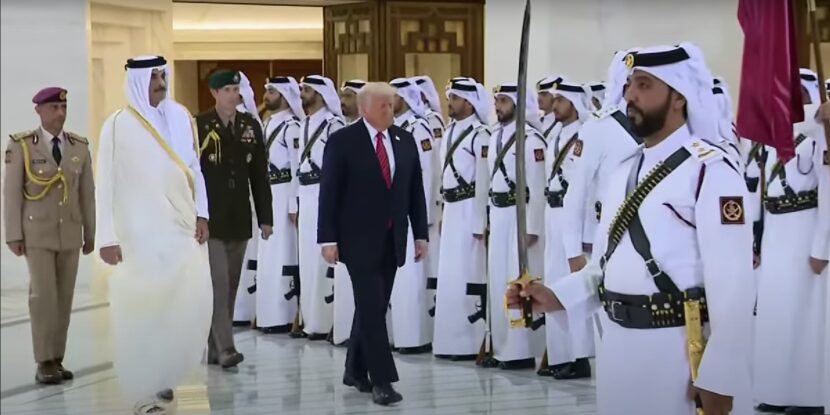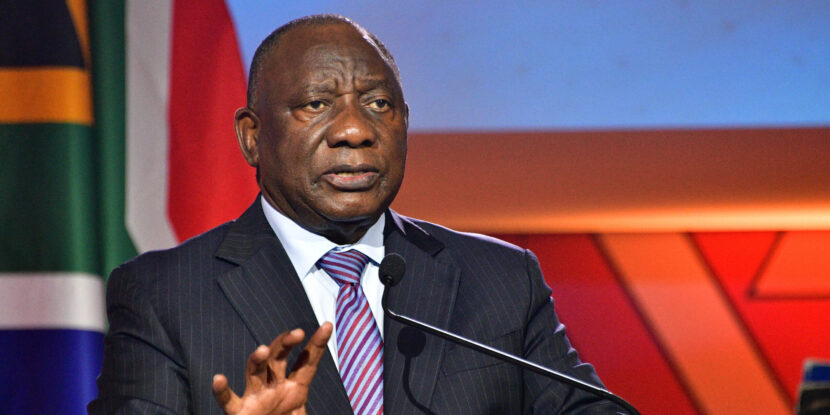
PULSE POINTS:
❓What Happened: President Donald J. Trump signed a $1.2 trillion economic exchange agreement with Qatar, alongside $243.5 billion in additional economic deals.
👥 Who’s Involved: President Donald J. Trump, Qatari officials, U.S. Defense Secretary Pete Hegseth, Boeing.
Your free, daily feed from The National Pulse.
📍 Where & When: Doha, Qatar, on Wednesday, following Trump’s visit to Saudi Arabia on Tuesday.
💬 Key Quote: “The landmark deals celebrated today will drive innovation and prosperity for generations, bolster American manufacturing and technological leadership, and put America on the path to a new Golden Age.” — White House statement.
⚠️ Impact: The agreement includes a $200 billion Boeing aircraft deal and further defense cooperation.
IN FULL:
President Donald J. Trump and Qatari officials signed a “joint declaration of cooperation” on Wednesday during Trump’s visit to Doha. The agreement comes as part of a broader diplomatic push by the Trump administration following his stop in Saudi Arabia earlier in the week.
According to the White House, the deal will “generate an economic exchange worth at least $1.2 trillion,” alongside “economic deals totaling more than $243.5 billion.”
Coinciding with the signing, Qatar announced a major aircraft purchase from Boeing, involving 160 wide-body jets valued at over $200 billion. Trump called the deal “fantastic” and described it as a “record” for Boeing. The agreement also includes an option for additional aircraft, underscoring the administration’s emphasis on foreign investment in US manufacturing.
Qatar has also offered the administration a luxury Boeing 747 aircraft worth as much as $400 million to replace Air Force One, as Boeing has delayed the delivery of the new Air Force One fleet, initially promised in 2024. “We’re giving to everybody else, why wouldn’t I accept a gift? Because it’s going to be a couple years until the Boeings are finished,” President Trump said this week.
Some have criticised the gift. Qatar has a history of supporting groups like the terrorist organisation Hamas in the past. However, it has been a key mediator in the Israel-Hamas conflict, facilitating hostages being freed. It was also part of prior ceasefire negotiations.
The Doha visit followed Trump’s announcement in Saudi Arabia of $600 billion in investment commitments, including significant data center infrastructure projects involving companies like DataVolt.
Meanwhile, U.S. Defense Secretary Pete Hegseth signed a statement of intent with Qatar to enhance defense cooperation. The agreement included finalizing letters of offer and acceptance for the delivery of MQ-9B drones and FS-LIDS systems.
Jack Montgomery contributed to this report.

PULSE POINTS:
❓What Happened: South African President Cyril Ramaphosa criticized white Afrikaner refugees for leaving the country, labeling their departure as “cowardly.”
👥 Who’s Involved: President Cyril Ramaphosa, Afrikaner refugees, U.S. President Donald J. Trump, Afriforum CEO Kallie Kriel.
Your free, daily feed from The National Pulse.
📍 Where & When: South Africa; comments made at an agricultural convention following the arrival of 49 Afrikaner refugees in Washington, D.C., on May 13.
💬 Key Quote: “When you run away, you’re a coward, and that’s a real cowardly act, and I expect every South African to stay here, and we work together, and we solve our problems.” — President Cyril Ramaphosa.
⚠️ Impact: The remarks highlight tensions over South Africa’s racist land redistribution policies and the U.S. granting refugee status to Afrikaners.
IN FULL:
South African President Cyril Ramaphosa has denounced white Afrikaner refugees who recently emigrated to the United States, describing their departure as an act of cowardice. His comments came after the first group of 49 Afrikaners, granted refugee status by the U.S., landed in Washington, D.C. Reports suggest up to 70,000 additional Afrikaners have applied for refugee status under the policy.
Speaking at a surprise appearance at an agricultural convention on Tuesday, Ramaphosa addressed the issue, stating that those leaving South Africa were unwilling to accept the government’s “transformation” policies. New “expropriation without compensation” laws aim to forcibly redistribute land and wealth along racial lines.
“They may be feeling excited they’ve left the country, they’ve got somebody like President Trump, but in the end, it’s a group of South Africans demonstrating that the changes and transformation that we are embarking upon here, they are not favourably disposed to it, and that’s why they are running away.”
He continued, “When you run away, you’re a coward, and that’s a real cowardly act. I expect every South African to stay here, and we work together, and we solve our problems.”
Afriforum, a group representing Afrikaners, pushed back against Ramaphosa’s statements. CEO Kallie Kriel issued a strong response on social media, accusing the South African government of fostering an unsafe environment for Afrikaners. The group often highlights threats and violence, including deadly violence, targeting white farmers in the country, even before the government’s moves to seize their land.
President Donald J. Trump has accused the South African government of presiding over a “genocide” against Afrikaners. Tensions between the governments of the two countries have been high in recent months over the mistreatment of white Afrikaner people, who have been in southern Africa since the 1600s—which is as long as some of its black African ethnic groups, with roots in tribes that migrated to the territory from further north, at least in some areas.
South Africa is a country where the radical Economic Freedom Fighters (EFF) political party, led by extremist Julius Malema regularly sing a song calling for the killing of Afrikaner farmers. Malema himself has not ruled out murdering white South Africans if his extremist party—already the fourth-largest in the South African legislature, out of 18 with representation there—ever comes to power.
“We’ve not called for the killing of white people, at least for now. I can’t guarantee the future,” he said in an interview in 2018.
show less

 1 month ago
3
1 month ago
3








 English (US) ·
English (US) ·